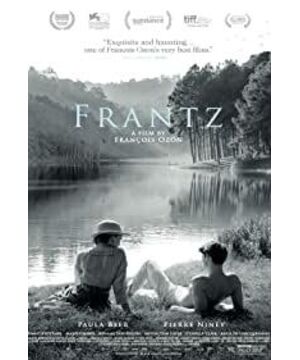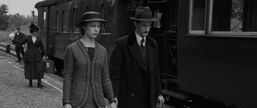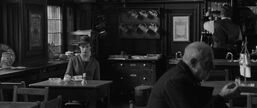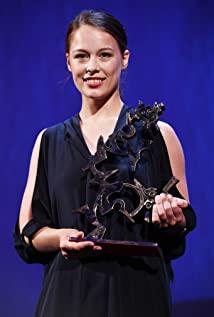The story takes place in Germany after the First World War. At that time, people were generally immersed in the sadness of defeat. They had already lost the arrogance at the beginning of the war. National honor became synonymous with nothingness overnight, and most of them were full of necessary doubts about the future. In this context, the feeling of "gentleness" can be seen as an illusion brought about by the sad to suffocating atmosphere.
The protagonist Anna is undoubtedly the more unfortunate among the misfortunes. What she lost was not only a fiancé, a possibly happy family, but also the belief in living. Therefore, she frequently pays tribute to Franz's tombstone, which is nostalgia, and perhaps an escape from real life. Her elegance did not make her choose to be as radical as Franz's father, and attribute his death to every Frenchman, but the silence of confusion and nowhere to vent only made Anna even more repressed. And Cruz did not court the scene, and it was like a sharp knife piercing her scar at any time.
Therefore, Adrian came at the right time. He wanted to redeem his sins. He didn't know that he had saved the other person invisibly. He didn't expect that his white lie would bring them extravagant hope, and he didn't expect that he and Anna would fall in love... The original hostile parties ended up Relying on each other to get comfort, I believe this is behind the superficial love story, another place worthy of fun.
From the time Adrian's secret was revealed, the story gradually became more interesting. The biggest attraction is that after Anna turned into a "seeker", the moral of the scene reappeared: the French man on the train, half-face burned, just like Franz in my dream; in the bar , The French sang the national anthem in unison, just like their father and friends; in the cemetery, people came and went to pay tribute to the dead in the war... These mirror-image events piled together, seeming to convey a distinct Message: We are the same.
I believe that Ou Rong is not only making references to love and war, but "we" has also escaped from the category of men and women: this already filthy world does require tolerance, and only tolerance can save the world. Owning it and passing it on is the responsibility of being a human being. In the chaotic world of hatred, it is especially valuable, and there is even a tendency to become a proof of the existence of a "human". From this point of view, Adrian, the character who bears sin and seeks forgiveness, is extremely symbolic.
It is undeniable that Anna also went to Adrian with selfishness. She had already completed her empathy for Adrian in her hometown. On the one hand, Adrian and Franz have similarities in appearance, hobbies, etc.; on the other hand, Adrian has "memories" with Franz. These lies make Anna and her family feel the long-lost beauty . Even after being dismantled, Anna gradually understood his harmless goodwill, but felt a different temperature from ordinary people. It was difficult for Anna to replace him with his goodwill towards Franz. By the time Anna set off, she had already carried too much on Adrian.
But Ou Rong rejected a cliché ending, and then the appearance of Adrian's fiancee shattered Anna's dream. But in my opinion, the final goodbye between Anna and Adrian is not so much a lingering entanglement, as a celebration of Nirvana-for Adrian, he will become more brave when he is now but long-cherished; for Anna, like The smile in front of "Suicide" is a distance from love, but it is the arrival of another noble emotion: the eager desire for life after being empowered by death is rising in my heart.
Presumably, Ou Jong used "Franz" as the title, which is exactly what he wanted to show. The deceased is gone, not for the living to torture themselves for suffering, but to regain the responsibility and confidence for tomorrow.
Finally, briefly talk about the use of colors in the film. Ou Rong does the opposite of most of the processing in the film. The beautiful emotions such as memories and fantasy are used in color, and the real part is used in black and white. The meaning of the memory of the past, the helplessness of the present, and the despair of the future is clear. Recognizable; and in the end, with Anna's smile, black and white turned into colorful colors, Anna also completed her self-transformation. Not complicated, but absolutely icing on the cake, the form and content are perfectly combined.
View more about Frantz reviews











